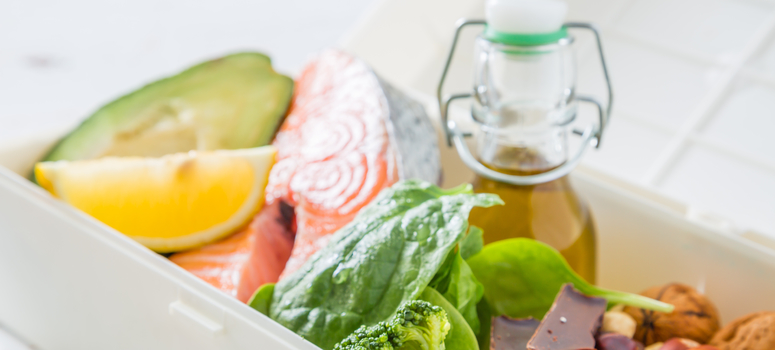December 2016 NewsBlast | Article 2
20 Dec 2016 / NAFCTo Beat The Holiday Weight Gain Blues: Know Thyself
By Tammy LeBoss | thefitprofoodie.com
Part 1 of 2

Are you ready for the holiday season?
Are you prepared for the eating challenges it brings with it? While some of us may seek out the fun and festivities, others may feel obligated to attend parties where sinful feasts and sweets tempt us to overeat. Consequently, many of us will deal with the dreaded holiday weight gain. Studies show that on average, people gain 5–10 unwanted pounds during this time of year. And of those who are dieting, 95 percent of these individuals will gain their weight back. Why is weight gain so prevalent this time of year?
The key to beating these scary statistics is to know thyself.
What this means is understanding what type of eater you are: Are you an all-or-nothing type of eater? Or, or are you more of a ‘Sensible Sam or Susie’ eater personality? If you fall under the category of all-or-nothing, the following is recommended:
1. Ditch deprivation (for the all-or-nothing person)
One of the most common mistakes the all-or-nothing individual makes during the holidays is that they deprive themselves. They starve themselves and skip meals so they can indulge on a big holiday feast later. This is the typical unhealthy dieter’s mindset and will lead to failure. This type of unhealthy thinking will also cause us to miss out on enjoying a variety of delicious foods.
Many people skip breakfast or not eat all day in an attempt to save their caloric points for later. This logic is backwards. The all-or-nothing mindset backfires for two main reasons. It promotes undesirable unstable blood sugars, and under-eating slows the metabolism. It may sound counter intuitive, but do not deprive yourself during the holidays. Psychologically, we all need to treat or reward ourselves on occasion, and these moderated rewards can encourage the willpower to stay on a healthy course.
2. Add variety (for the Sensible Sam & Susie type eaters)
We all know this type, the sensible eater type personality. Typically, this type of eater will eat only ‘healthy’ foods, they may be gung-ho about paleo, or they may be devoted vegans. Or, perhaps you fall under this category yourself? If you or someone you know does, it’s likely that you’re depriving your body of a complete profile of nutrients. Studies show for example, that most vegans lack the proper building blocks required to build a healthy body.
Did you know that incorporating a variety of foods can broaden the array of nutrients available to your body? This season, try to let go of finicky food preferences, and you may discover enjoyment of new and delicious healthier food options. Try a variety of colors, textures and flavors. Variety can increase optimization of nutrient uptake, fuel the body with energy, and improve overall health. Furthermore, guess what happens when the body is getting all the nutrients it needs? It’s less likely to undergo cravings! Regardless of what your fitness goals are or what your body type is, you’d be wise to expand your food preferences. The holiday season is a perfect opportunity to try new foods, perhaps foods that you didn’t think you’d like.
Pro Tip:
Try a new veggie dish such as caramelized brussel sprouts, or an omega-3 rich protein source such as salmon or halibut. Offer to bring a colorful and festive organic salad, or bring a healthy gluten-free berry dessert to your festivities. On your plate, create a ‘sampler platter’ consisting of a variety of real food options. Be sure to limit the processed stuff as much as you’re able.
To avoid the holiday weight-gain blues, remember this:
the psychology of deprivation will only lead to binging and cravings later.
You can avoid this pitfall by allowing yourself occasional treats — whether this is in the form of a cheat meal or a holiday feast. Reward yourself for your hard work on your fitness plan. And remember, it’s not cheating when you’re giving the body and mind what they need: Real food. Real nutrition.
Beat the holiday blues. Know thyself. Make it an adventure. Keep unwanted pounds off by ditching deprivation. Allow yourself to enjoy but within reason. :)
August 2016 Newsletter | Article 2
05 Aug 2016 / NAFCNAFC Newsletter
2 Ways to Beat the Summer Heat!
By Tammy LeBoss | thefitprofoodie.com

The heat is here, school is out and the summer games on!
Fun and games can however, become ‘not so fun’ when water intake is overlooked and good oils are turned bad. This summer, be sure to pay extra attention to oil and water—how to properly store, and how much to drink, respectively. Water has been referred to as the 2nd most important nutrient after oxygen. Here’s why it’s critical to our health. Did you know that mild dehydration is one of the most common causes of daytime fatigue? Estimates show that 75% of Americans have mild, chronic dehydration. This is alarming since proper hydration is required for maintaining healthy blood flow, proper kidney function, proper sodium/potassium/electrolyte balance and proper digestive functions.
Water gives us life. Did you know that the human body is comprised of 65% water? Water is necessary for life to exist, makes us healthier and it’s incredibly refreshing especially after a workout. Water is not only the most important nutrient in the body, but also the most abundant. It’s critical to the balance of all the body's systems, including the brain, heart, lungs, kidneys and muscles. In fact, the body needs water for millions of metabolic processes, temperature control, fluid volume, and lubrication.
Can we drink too much water and how much is enough?
When determining how much water is appropriate, consider the individual. How much to drink each day will depend upon a few variables. Drink enough water to replace normal daily losses via perspiration, waste removal, and breathing.
The following factors also contribute to the need for increased water consumption:
- Increased or hot weather
- Increased workload
- Increased respiration
- Increased bowel movements
- Large amounts of caffeine or sugar consumed
NAFC’s Nutrition Coach Course recommends the following rule-of-thumb formula for determining your optimum daily water intake: Consume between 1⁄2 to 1 oz. of purified water per day per pound of body weight depending upon your general activity level and your environmental conditions or surroundings.
This does not include compensation for losses due to exercise or excessive sweating. Add another 6-12+ ounces per 15-20 minutes of exercise depending on how hot it is, the relative humidity, and how much you sweat in relation to others under the same conditions. Although the exact amount of water needed per day is undetermined by scientists, we believe it depends on the individual.

Preventing Good Oils from Turning into Bad
We’ve all heard about the health benefits of olive oil. Embraced by many health nuts, ‘good fats’ such as olive oil, fish oil, coconut oil, avocado and walnuts are known to fight inflammation, reduce risk of heart disease, and reduce the likelihood of Alzheimer’s disease. Many of us cook with olive oil, but did you know that olive oil is only good for us when it’s used cold? Increased heat can increase the likelihood of oxidation. In fact, it's important to realize olive oil is not necessarily good for cooking. Why? Due to its chemical structure and a large amount of monounsaturated fats such as oleic acid, heating olive oil when cooking can turn this good fat into a bad one. To learn more, geek out on science with NAFC’s Nutrition Coach Certification and find out how heat can actually damage certain foods, changing their molecular structure(s) so they’re no longer beneficial to our health.
Concerned about oxidation and rancidity? Try cooking with coconut oil. It is the ideal choice because it’s a vegetable fat stable enough to resist heat-induced damage. This summer, protect your oils from going bad; store foods, namely good oils away from sunlight and heat.
Here are more tips for protecting your food oils:
- Keep in a cool, dark place -darkness is key because light will definitely oxidize the fats in olive oil and other good fats
- Purchase smaller bottles rather than larger to ensure freshness
- Immediately replace the cap after each pour, keeping bottles tightly capped
- Add olive oil or other healthy oils to foods after cooking
- Avoid leaving food out exposing it to air; the longer food sits around, the greater the likelihood of oxidation
With respect to light, purchase oils in bottles made from darker-tinted glass. They will usually be dark brown or dark green in glass color. Also, store your oils, almond butter and nuts in a cabinet that is lightproof. With respect to heat, many oils can be kept fresh if stored in the refrigerator where the temperature remains continuously low. To learn more, do your research to understand the chemical composition of an oil. This is will be a key factor in preventing the risk of rancidity and potential health issues. Remember 1 key basic principle involved in saturated and unsaturated fats: The more saturated fat contained in an oil, the less susceptible it is to rancidity. The greater the amount of unsaturated fat in an oil, the more likely it is to become rancidity.
Remember, fat heals, protects and satisfies us—
...but only when it’s kept fresh for our stomach and taste buds!
July 2016 Newsletter | Article 4
21 Jul 2016 / NAFCNAFC Newsletter
The Problem With Giving Up Sugar For Good!
By Tammy LeBoss | thefitprofoodie.com

The obesity epidemic is on the rise! Is sugar part of the problem?
An expanding waistline. This is the first symptom doctors are told to look for in diagnosing metabolic syndrome. This means that if you’re overweight, there’s a good chance you have metabolic syndrome. For those who have heart attacks, metabolic syndrome will very likely be the reason.
Some holistic health coaches and nutritionists say, Americans should give up sugar. The problem with this type of ‘all-or-nothing’ mindset is that it’s likely to encourage even more cravings, thereby creating an endless cycle of failure. Let go of this mindset. Instead, consider swapping this (out) for that.
For example, simple swaps include replacing:
- coffee for green tea
- beer for kombucha or club soda
- a cocktail for a ‘mocktail’- try mineral water lightly sweetened with stevia and lemon
- regular chocolate with high quality dark chocolate, carob or cocao
- ice cream for creamy almond, hemp or cashew milk with blueberries as a healthy dessert option.
To reduce cravings, also consider adding L-glutamine supplements and spirulina to your eating plan. Replace the idea of ‘dieting’ with ‘lifestyle change’. Fueling the body with high anti-oxidant power help the body naturally feel nourished. By giving the body what it needs, cravings for junk food and sugar can be lessened.
begin ... prev 1 2 3

